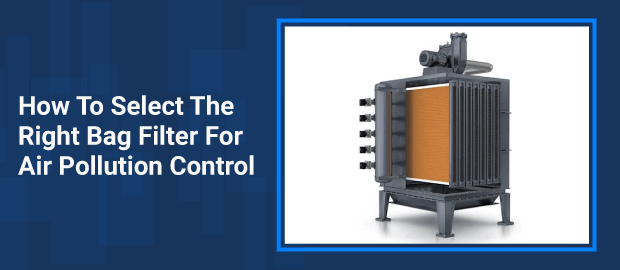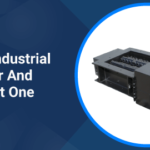Airborne diseases are becoming severe and fatal with the rise in air pollution. Therefore, the need to breathe cleaner air is becoming a necessity, especially in industrial facilities. In order to improve air quality, bag filters are essential for removing dangerous particles and pollutants from industrial operations. Therefore, it’s critical to make the right Bag Filter selection for environmental conservation.
There are various factors that are essential to making the right choice for a bag filtration system, from the particle size in the air volume and filter fabrics to the exhaust fan type to your specific industry compliance. Read this guide to learn about the role of bag filters in industrial sectors and choose the right product among its varieties of types.
A] What Are Bag Filters?
Industrial processing plants and manufacturing facilities operators should invest in bag filters to preserve clean air conditions to meet health and safety compliance according to the industrial standard. These filters are also known as industrial dust collector filter bags that are used to capture and eliminate dust, pollutants and particulate matter from airstreams produced during material processing procedures. These bags are made of fine synthetic materials such as polyester, polypropylene or fibreglass.
A high-quality dust collector filter bag material provides excellent particulate matter collection and retention while permitting clean air to flow through due to its innovative weaving design. Bag filters are especially crucial in those sectors where the processing facilities use boilers as they maintain clean air and stop dangerous pollutants from spreading.
There are many industrial sectors that use bag filters, such as mining, cement manufacturing, food processing, pharmaceuticals, and chemical manufacturing. Bag filters for your industry have become essential during material processing as they collect and retain airborne particles to stop them from escaping into the environment, which can endanger the health of engineers, workers, and the surrounding communities, which can damage the equipment and contaminate products.
Due to their effectiveness in seizing these particles, industrial operators can maintain their equipment integrity, worker health and air quality. It helps with preserving hygienic working conditions while adhering to manufacturing regulations that maximise the effectiveness of material processing.
Improve Air Quality With Industry-Specific Bag Filter!
B] Types Of Bag Filters
In order to preserve the industrial environment and air quality preservation, it is essential to learn what different types of bag filter options are available to pick out the suitable one. Each type has a specific working mechanism to effectively capture and remove air particulates from the industrial airstreams. Choose the right bag filter type that is suitable for your industrial applications.
1. Mechanical Shaker Bag Filters
Using mechanical shaker bag filters will make it easier to clean the filter bags easily and effectively. This bag filter for air pollution control uses a shaking motion in a routine manner to remove collected dust, which is supported by metal cages. It ensures effective airflow and filtering with this mechanism, especially when the dust is very sticky, or filter bags are of heavy materials. Mechanical shaker bag filters are most suitable for grain processing, metal factories, woodworking, etc., which produce moderate to severe dust loads and have low air volumes. However, it is not a suitable option for areas with heavy dust loads or strict emissions.
2. Reverse Air Filters
Reverse air bag filters work by using a reverse flow of air mechanism to remove the particles contained in the bags. It flexes and expands in order to loosen collected dust. Since they have large bag diameters and low air-to-cloth ratios, these filters are appropriate for use with materials that are temperature-sensitive and heavy dust loads. These filters are suitable for industrial environments where reliable airflow and temperature control is crucial, such as metal smelting facilities, thermal power plants or cement kilns. Unlike other bag filters, reverse air filters require more upkeep.
3. Pulse Jet Filters
Pulse jet bag filters use compressed air bursts to dislodge accumulated dust that is collected in a collection hopper. They can run constantly without obstructing airflow, making them highly efficient. The bag is injected with compressed air, which causes it to expand and collapse rapidly. Its injection air flow puts a peeling force on the expansion filter bag, and its reverse acceleration during retraction is used to remove the dust layer. From food processing to chemicals and medicine, the manufacturing industry can benefit from this filtering mechanism. Since it offers high filtering efficiency, low downtime and low energy usage, pulse jet filtering is one of the most popular options for industrial applications.
Filter bags can be either cylindrical top removal type, cylindrical bottom removal type or cassette / rectangular side removal type.
Improve Air Quality With Industry-Specific Bag Filter!
C] Factors to Consider Before Selecting A Bag Filter For Air Pollution Control
1. Dust Collection Source
Choosing the appropriate bag filter requires an understanding of the major sources of dust formation. The filtration effectiveness and filter media are affected by dust particle shape, size, and abrasiveness. Dust formation in industrial settings is greatly influenced by a pneumatic conveying system, which is usually used for bulk material transportation. Thus, using bag filters in a pneumatic conveying system is essential to maintain air quality and equipment integrity that effectively removes and captures particles from the atmosphere. Apart from that, crushers, bunker tops, vibratory screens, and mills like industrial equipment generate dust.
2. Air Volume For Your Industry
Various elements such as facility size, dust-producing activities, and regulatory requirements affect the air volume or airflow rate in the industry. This will influence the selection of a bag filter that is suitable for your industry. It is measured in m ³/h or Nm ³/h.
3. Filter Fabric
Effective filtration depends on selecting the right filter fabric considering its durability, resistance to chemical corrosion or abrasion, efficiency and dust release. Some popular examples of bag filter fabric are polypropylene, polyester, nylon, PTFE, acrylic and fibreglass. Consider the fabric with robust temperature and chemical resistance for your specific industrial application.
4. Dust Type
The performance of filtration is impacted by the wide variations in dust properties. It can contain everything from coarse particles like metal shavings or wood chips to small particles like silica dust. When choosing the right filter media for creating filtration systems, it is essential to know the composition and size distribution of dust. Selecting the ideal dust collector is made easier by researching product kind, emitted particle type, and bag filter type. Moreover, you must learn the micron rating of every particle type to find the right bag filter for our industrial application.
5. Temperature And Moisture Resistance
Make sure to choose a bag filter that can tolerate different temperatures and moisture levels as per your specific industry requirements. Hence, it is crucial to choose heat-resistant fibres that are needed for high-temperature operations like metal smelting or cement kilns. Moreover, the filter should be waterproof or moisture-resistant when used in a damp or humid environment. Polyester has excellent absorption capacity and resistance to oxidation, which makes it a good synthetic material for bag filters. Make sure to inspect the bag filter before installing it to ensure its optimum operational capability.
6. Exhaust Fan Type
What type of exhaust fan you install in your industrial facility has a major impact on the effectiveness and performance of a bag filter system. Consider the fan size, airflow capacity, static pressure, and energy usage before selecting the exhaust fan. When the bag filter and exhaust fan have proper operational coordination, it will ensure the best airflow and pressure conditions for efficient dust collection. The exhaust fan is in charge of moving dust-laden air from dust sources to the bag filter. So, it needs to be designed properly to produce the required airflow and maintain the design air volume.
7. Pressure And Loss Of Pressure
In order to ensure the bag filter system operates effectively, it is essential to know the pressure needs and pressure loss characteristics of the system. Check for ductwork resistance in the facility and how the equipment layout impacts the pressure drop. If you want to minimise the pressure drop, make sure the facility has consistent airflow and energy efficiency. Moreover, the static pressure value of the micro fan and its installation position before and after the bag filter should be considered.
8. Industry Specific Requirements
It’s essential to ensure you comply with your industry-specific air pollution regulations to ensure the bag filter operates effectively.
Improve Air Quality With Industry-Specific Bag Filter!
Conclusion
Make sure to make an informed decision when choosing the bag filter specifically for your industrial environment. It will help your industrial facility workers maintain their safety with controlled air pollution in the working facility. Therefore, learn the various forms of bag filters for industrial use that are available in the market and consider the factors that go into selecting a suitable air filtration system as per your industry-specific requirement.
Work with a reliable pneumatic conveyor manufacturer to ensure a lower air pollution rate in the operational facility and comply with industry regulations. Contact us today if you need assistance selecting the right capacity bag filter for your industrial application at a competitive price!


